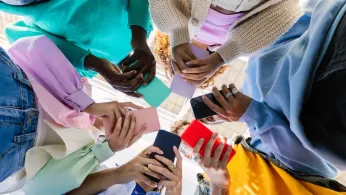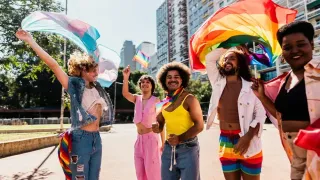
4 hours ago
Queer Slang in 2025: The Words That Wove Our Digital Rainbow
READ TIME: 5 MIN.
If you spent any time scrolling through queer Twitter, hopping onto TikTok, or catching the latest drag brunch meme in 2025, you know: our words are never just words. Queer slang isn’t just a way to communicate; it’s how we recognize each other in the wild, signal safety, and turn the world’s shade into our own shimmer. This year, a fresh crop of phrases not only dominated comment sections but also made their way into pop culture, political discourse, and even—dare we say—mainstream advertising. But what does it mean when language itself becomes a site of queer defiance and belonging?
Mothering the Moment: The Rise of “Mother”
“Mother”—once a term reserved for ballroom icons and house founders—went full mainstream in 2025. To call someone “Mother” is to crown them the blueprint, the emotional anchor, the diva whose influence radiates across timelines and dancefloors alike. Whether it’s Beyoncé on her Cowboy Carter Tour or your local drag queen who keeps the brunch crowd fed and hydrated, “She’s Mother” is now the highest queer compliment, both reverent and playful.
“Mothering,” meanwhile, evolved into a verb—nurturing while slaying, giving you life and maybe some side-eye. As one viral tweet declared, “She didn’t just serve, she mothered the entire venue.” The phrase’s popularity is a love letter to the matriarchs who hold our communities together, whether online or IRL. It’s also a subtle reminder that the roots of this word run deep: from the ballroom floor to the family chat, queer folks have always known how to choose and cherish our mothers.
Spilling “The Tea”: Gossip as Power
Every generation of LGBTQ+ people has its own word for gossip, but in 2025, “the tea” reigns supreme. Born from Black drag and ballroom culture (“T” for truth), it’s become a catch-all for information, insight, or chaos, sometimes all at once. In queer spaces, to spill the tea isn’t just about drama—it’s about clarity, transparency, and sometimes, survival.
Whether it’s dissecting celebrity mess or exposing political hypocrisy, “the tea” is a reminder that knowledge is power. It’s our way of saying, “We know what’s really going on”—and we aren’t afraid to name it. In a year marked by political upheaval and renewed attacks on LGBTQ+ rights, the act of sharing tea became a communal shield, fueling activism and keeping each other informed.
100 Footer: Visibility as a Badge of Honor
The “100 footer”—someone whose queerness radiates from 100 feet away—was once a teasing jab, but in 2025, it’s a celebration of visibility. It’s about the crop top, the confident walk, the unmistakable vibe that says you don’t need to explain yourself. In a world that still tries to closet us, owning the label “100 footer” is a badge of pride and a wink to anyone who’s ever been clocked before they spoke.
The term has also sparked conversations about the politics of visibility—who gets to be “seen” as queer, who feels safe showing up as themselves, and how we can make space for all shades of the rainbow. As one advocate put it, “Being a 100 footer isn’t just about being obvious—it’s about being unapologetic.”
It’s Giving…: The Vibe Check Heard Round the World
“It’s giving…” has become queer culture’s ultimate vibe check, a two-word review that can mean anything from “fabulous” to “tragedy” to “absolute chaos.” Originating in ballroom scenes and then adopted by TikTok creators and Instagram meme accounts, the phrase lets us assess outfits, politics, and performances without ever naming them outright.
Want to describe a killer look? “It’s giving power top.” Political drama? “It’s giving dystopia.” As the Pride.com article notes, by 2025, “It’s giving…” is an entire tonal language—flexible, campy, and always a little fabulous. It’s proof that queer people can turn any moment into a meme, and any meme into a movement.
Serve, Ate, Cunty: The Holy Trinity of Queer Performance
Performance verbs like “serve,” “ate,” and “cunty” exploded across digital platforms in 2025. These words, born from Black and Latinx ballroom culture and popularized by RuPaul’s Drag Race, are shorthand for excellence, domination, and unapologetic confidence.
To “serve” is to deliver greatness. To “eat” is to obliterate the competition. To be “cunty” is to do it all with audacity and style. This linguistic trinity isn’t just about shade—it’s about celebrating the queens who taught us how to own every moment. Every “she ate” typed this year is a tribute to drag culture’s enduring impact on the way we talk, hype each other up, and push back against conformity.
The Dolls and The Girls: Solidarity in Slang
In queer language, “the girls” and “the dolls” have never just meant women. These terms are endearments for everyone who embodies the divine feminine—drag queens, trans women, nonbinary femmes, and anyone dolling it up. By 2025, “protect the dolls” became a cultural mantra, part meme, part movement, and all heart.
Online, “the dolls” is shorthand for community love; offline, it’s a reminder that trans women and drag performers remain the beating heart of queer culture. As anti-trans sentiment and drag bans made headlines, the phrase took on new urgency, fueling social media campaigns and grassroots organizing. Our language is our armor, and “the dolls” are always worth protecting.
Reclaiming and Remixing: Queer Words as Resistance
The evolution of queer slang in 2025 isn’t just about fresh phrases—it’s about reclaiming and remixing the language that once hurt us. Slurs like “homo” and “limp-wristed” have been reimagined as cheeky badges of pride, poking fun at the very stereotypes that once kept us silent.
As described in The Advocate, “homo” is now unpretentious and kind of funny—a “f*ck you” without a social justice arm, poking fun at itself. “Limp-wristed,” once offensive, is now a celebration of the gaudy absurdity of queer culture, a wink to anyone who’s ever danced to Whitney Houston under a disco ball. The process of reclaiming these words is messy, personal, and often controversial, but it’s also deeply liberating—a way to turn pain into power and erasure into expression.
The Emotional Resonance: Language as Queer Home
What makes queer slang so powerful isn’t just the words themselves—it’s the emotional resonance they carry. In group chats, on stage, and across timelines, these phrases are signals: “You’re safe here.” “We see you.” “You belong.” They’re the pulse in our laughter, the armor in our irony, and the proof that language will always belong to those who twist it best.
As the internet continues to shape queer community, our lexicon becomes a living archive of resistance, joy, and connection. Whether you’re serving in six-inch heels or spilling tea at brunch, you’re part of a tradition that’s as old as Judy Garland and as new as your favorite meme.
Why It Matters: Queer Slang as Culture and Legacy
Language is how we find each other—and ourselves. In 2025, queer slang offered more than laughs and shade; it created community, claimed visibility, and fueled movements for justice. The words we choose are a form of activism, a way to rewrite the narratives imposed on us and build spaces where every identity is honored.
In a year marked by both celebration and challenge, queer slang reminded us that our voices matter—and our joy is unstoppable. Whether you’re a 100 footer, a doll, or just someone who knows when “it’s giving,” you’re part of the story. And in the words of this year’s lexicon: She ate.






